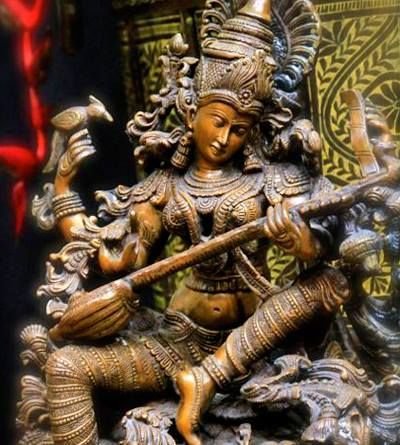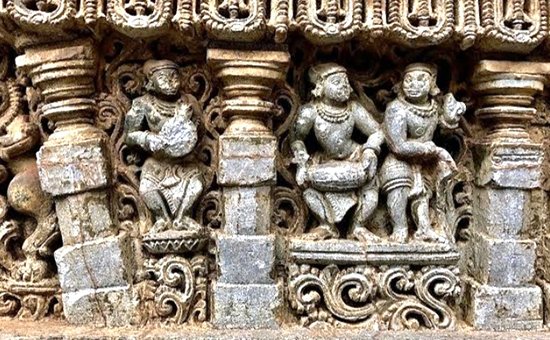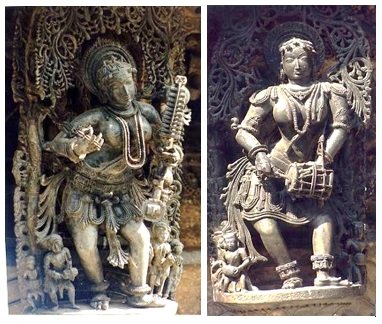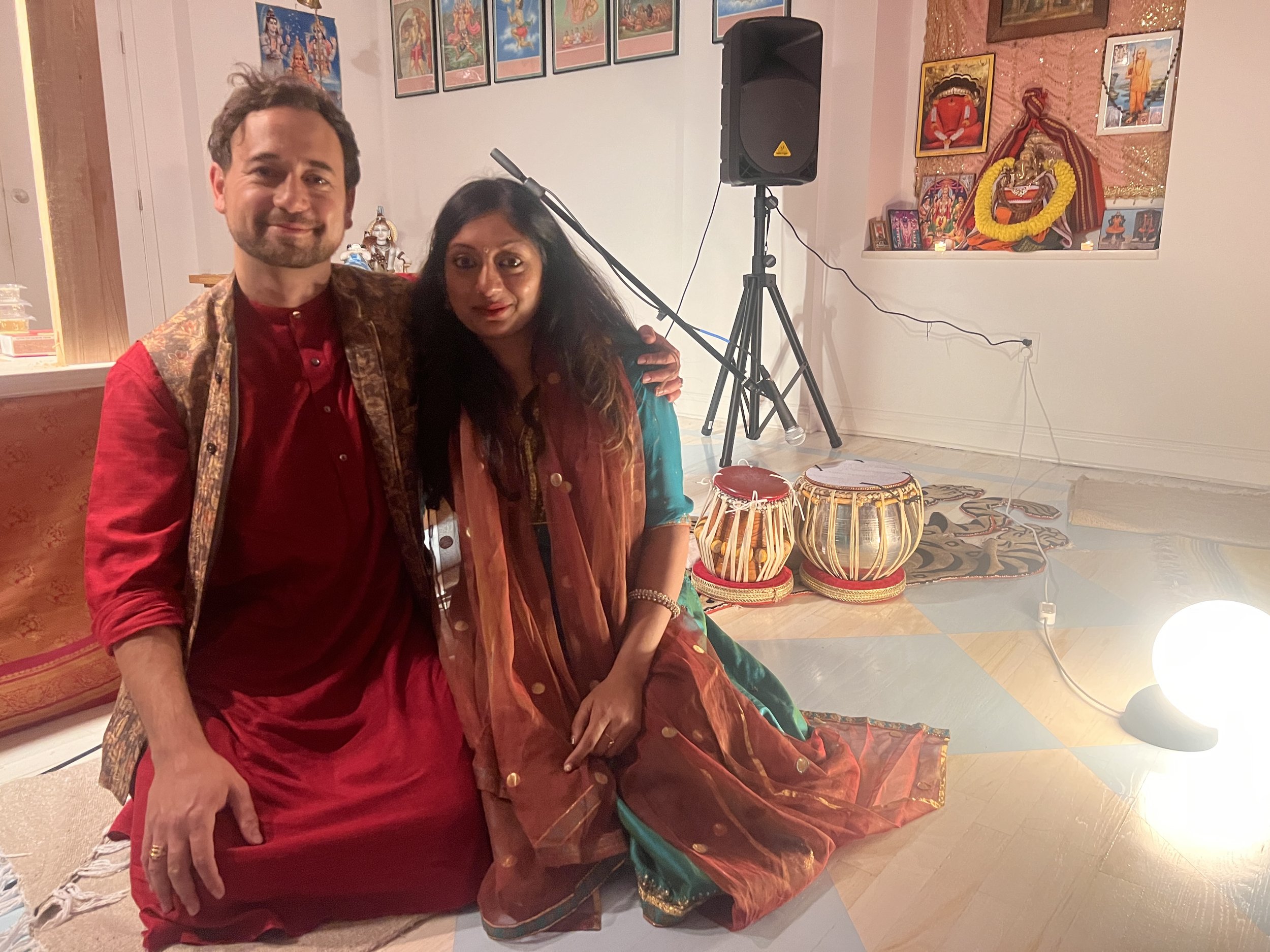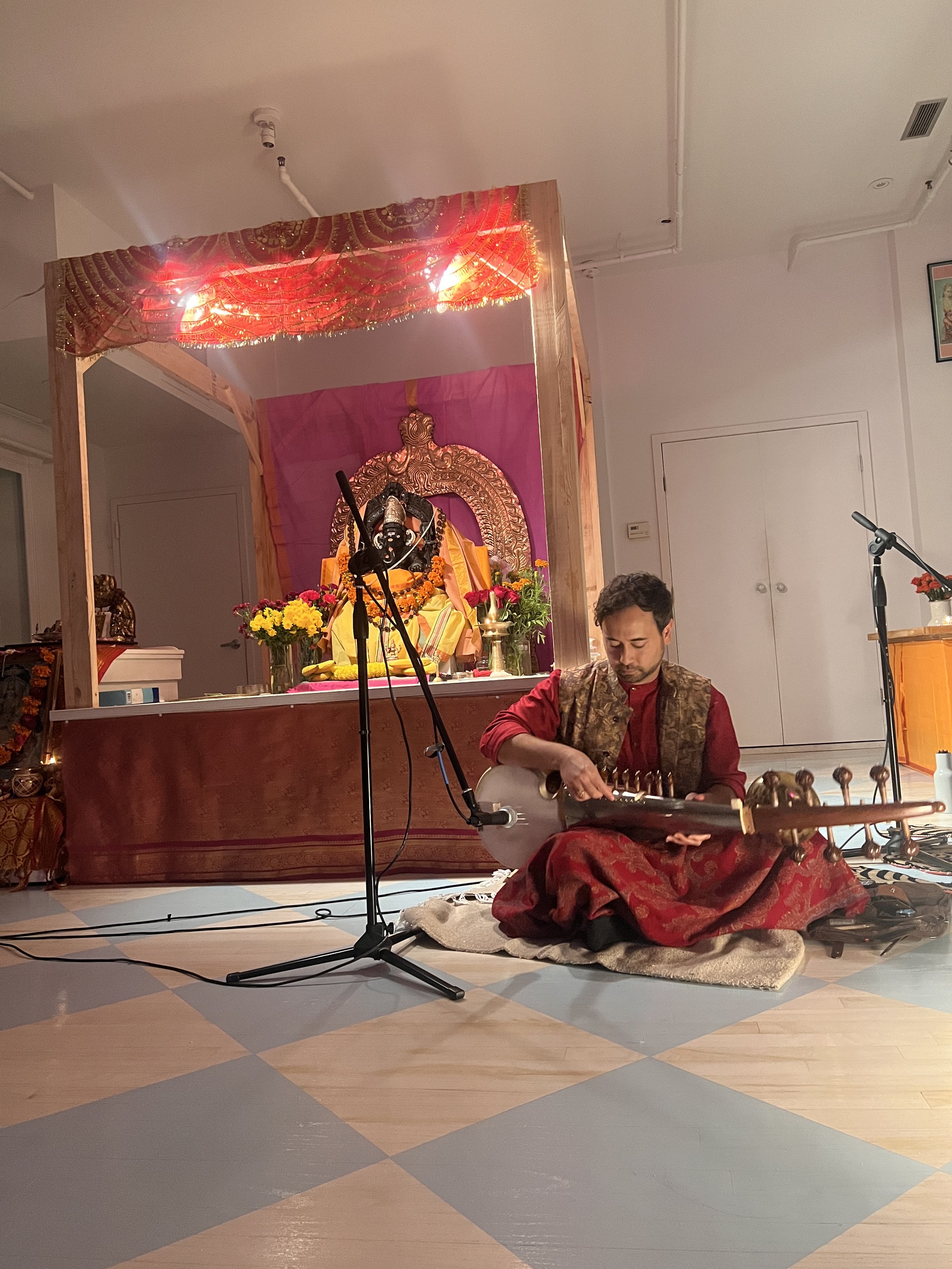Transforming Spaces : The Power of Indian Classical Music
Indian Classical Music knows no religion or divisions. Music knows only love which is all religion all faith. It has the power to unite and transport one to another realm.
“Sangeetham” means music in the Sanskrit language. “Sangeet” is the big ol’ dance party that takes place during a North Indian Hindu wedding. (India is a HUGE country it’s like 85 countries put into 1 no one speaks the same language, or practices the same faith, and our cultures vary dramatically, that’s what makes it so interesting the diversity!)
My mother named me “Sangeetha” which is also another name for the Hindu Goddess Saraswati who is the patron deity of music, fine arts, knowledge, and learning. My “Indian Classical” music training started when I could learn to speak. My mother trained me in both Hindustani (North Indian) and Carnatic (South Indian) classical vocal music traditions and had me trained in Bharatanatyam, Odissi, and Kathak Indian Classical dance forms. I’m very grateful to my mom for exposing me to music and dance at a very young age and the older I get the more I appreciate our traditions/culture!
ALL Indian Classical Music is rooted/stemmed from worship. Carnatic Music is a system of music associated with South India, including the modern Indian states of Karnataka, Andhra Pradesh, Telangana, Kerala, Tamil Nadu, and Sri Lanka. The “father” of Carnatic Music is Saint Purandara Dasa (early 15th C)
It is one of two main subgenres of Indian classical music that evolved from ancient Hindu Texts and traditions, particularly the Samaveda (10,000 BCE). The other subgenre is Hindustani music, which emerged as a distinct form because of Persian and/or Islamic influences from Northern India. The “father” of Hindustani Music is Amīr Khusrau a Sufi poet/musician/scholar (early 13th C)
The South Asian subcontinent has been making/playing music since BC times as seen in Hindu Temple architecture, art, and sculpture. Indian Classical Music is considered divine and holy. All instruments used are considered manifestations of the Goddess Saraswati (That’s why you will see many musicians cradling/handling their instruments with utmost love, care, and respect) Both Hindu and Muslim musicians play in Hindu Temples, especially in South India. It’s a beautiful interfaith display (they are dedicated to Music which is the divine not any particular deity at times)
Indian Classical Music takes years of intense practice, dedication, and devotion. When played in sacred spaces such as a temple, it is not for entertainment but an offering for the divine and a form of prayer.
Indian Classical Instrumental Music (both Carnatic and Hindustani) has the power to unite, transport the listener to the realm of the divine, and transform a space into a sacred one. Anyone can connect to instrumental music because there is no vocal (I know it can be difficult if one doesn’t understand South Asian languages and truly understand the meaning of the words)
Music is seen as a way to God in Hindu Traditions. Guru Anna (Nadhaswaram) and Lakshman Anna (Tavil) are Hindu Temple musicians from Tamil Nadu, India. They were in New York at
https://nyganeshtemple.org/ since September playing for all the Hindu High Holidays including the Maha Kumbhabishekham (reconsecration ceremony), Ganesha Chaturthi, Navarathri, Deepavali, and Sri Skanda Sashti. Morning, Noon, and Night they played their magic.
These South Indian Carnatic instruments are considered EXTREMELY SACRED & ARE LOOOOOOUD!
Why so loud? Because they drown out all bad thoughts, negativity, and bad energy. They are used in Hindu Temple rituals (awakening the deity, taking them out on procession, etc.)
These instruments are ABSOLUTE MAGIC they transport you someplace else. The intensity of Bhakti (devotion) and love with which the musicians played could be felt every single time! One forgets your bad emotions, mood, etc., and is able to connect with the divine!
The instruments are also SUPER HEAVY, they probably weigh more than their players LOL, yet they hauled them all the way to the roof and played for the re-consecration ceremony!
The origin of these instruments is ancient (BC Times) and they are rarely seen played outside of India in the west.
I gave the musicians my “Subhanallah” Nadhaswaram and Tavil drawing, they loved it and told me that classical/religious music doesn’t know the difference between Islam and Hinduism, both Hindus and Muslims play together all the time in sacred spaces and temples all across South India.
South Indians have a very different attitude than their North Indian counterparts (they love all faiths/religions and don’t see the difference, they follow the true path of Hinduism or Sanathana Dharma which means eternal truth and all faiths lead to the same divine, we also did not suffer the trauma of partition North India did ripping Hindus & Muslims apart :( (a very dark stain on human history)
My artwork https://www.ihsanishan.com/shop-online/subhanallah-nadhaswaram-art-print was inspired by a family of Muslim Musicians who have been playing these instruments for over 300 years at Sri Rangam Temple one of the largest Hindu Temples in the world dedicated to Lord Vishnu!
Thank you brothers for coming all the way from India and making these past few months EXTRA SPECIAL, truly an honor and delight to listen to you play every week at the temple. You will be missed tremendously!
Click below to hear the magic of Nadhaswaram and Tavil!
No photos are allowed to be taken inside the Temple (the Temple photographer is allowed he took this pic) it’s my absolute honor and pleasure to be able to give my artwork to Guru Anna and Lakshman Anna. Anna means respected brother in the Tamil language.
Hindustani musician Manik Khan is the son of the great Sarod Legend Ustadh Ali Akbar Khan. https://www.manikkhan.com/ Manik comes from a 500-year family legacy tracing its roots back to the Muslim court musicians of the Mughal Dynasty in India. The Sarod is an enchanting and beautiful instrument.
Manik and I grew up together in California. His father did the groundbreaking ceremony at the Shiva Vishnu Temple in Livermore, California (my father helped build the temple) It’s wonderful that a Muslim musician’s name is carved on the wall of a giant Hindu Temple in the USA and amazing that Manik’s dad and my dad’s names are both on the wall (we will always share a special bond)
Manik played at Broome Street Ganesha on Deepavali weekend. He spoke about Lord Ganesha and how his father instilled his love, and bhakti (devotion) for Ganesha at a very young age. The Ali Akbar College of Music in California emblem is Goddess Saraswati https://aacm.org/
Broome Street Ganesha is NOT a traditional Hindu temple it wasn’t consecrated, there’s no Hindu architecture outside, there was a DOG in the audience, and folks were sticking their feet out towards the deity and the musicians (this is EXTREMELY rude and disrespectful in Indian culture, NEVER EVER stick your feet towards the deity or a musician, if you can’t sit cross-legged on the floor sit in the back on a chair), etc.
I was also suffering from PTSD from volunteering here years ago and was getting angrier and angrier so many horrid emotions were coming up, things I did not want to be feeling in front of Lord Ganesha. But I kept my focus on Manik and the musicians who played BEAUTIFULLY. Their music was enchanting.
Manik refused to show his backside to the Lord Ganesha (this is considered disrespectful by a lot of musicians) so he chose to sit beneath the murthi (Ganesha statue) slightly to the left so he wouldn’t be blocking Ganesha. I thought Manik and I looked cute in our Deepavali outfits and wanted to take a photo, Manik insisted we sit instead of stand in front of Ganesha because he did not want to show his back to the Lord.
Manik’s love and bhakti for Ganesha is so admirable. When Manik was playing and when he was in prayer facing Ganesha, Lord Ganesha appeared (not out of the Murthi, but out of Manik!), to remind me that love and devotion to God are the most important not your surroundings. Manik transformed a space into a temple with his love and devotion for Ganesha and the intensity of his playing!!!!
It was lovely spending Deepavali with someone from home!
Click below to hear clips from Manik Khan’s concert.
Earlier this year I heard a Hindu priest speak about the importance of music, musicians, artists, and sculptors, (creatives in general) and how they must all be honored, respected, and cherished since their crafts are the way to reach God or the divine!
I adore that Indian Classical Music is a form of worship, the interconnectedness between Hinduism and Islam, the beautiful melodies and various ragas, has to power to transform and unite, but most of all it’s the way to reach the divine, who is LOVE!

